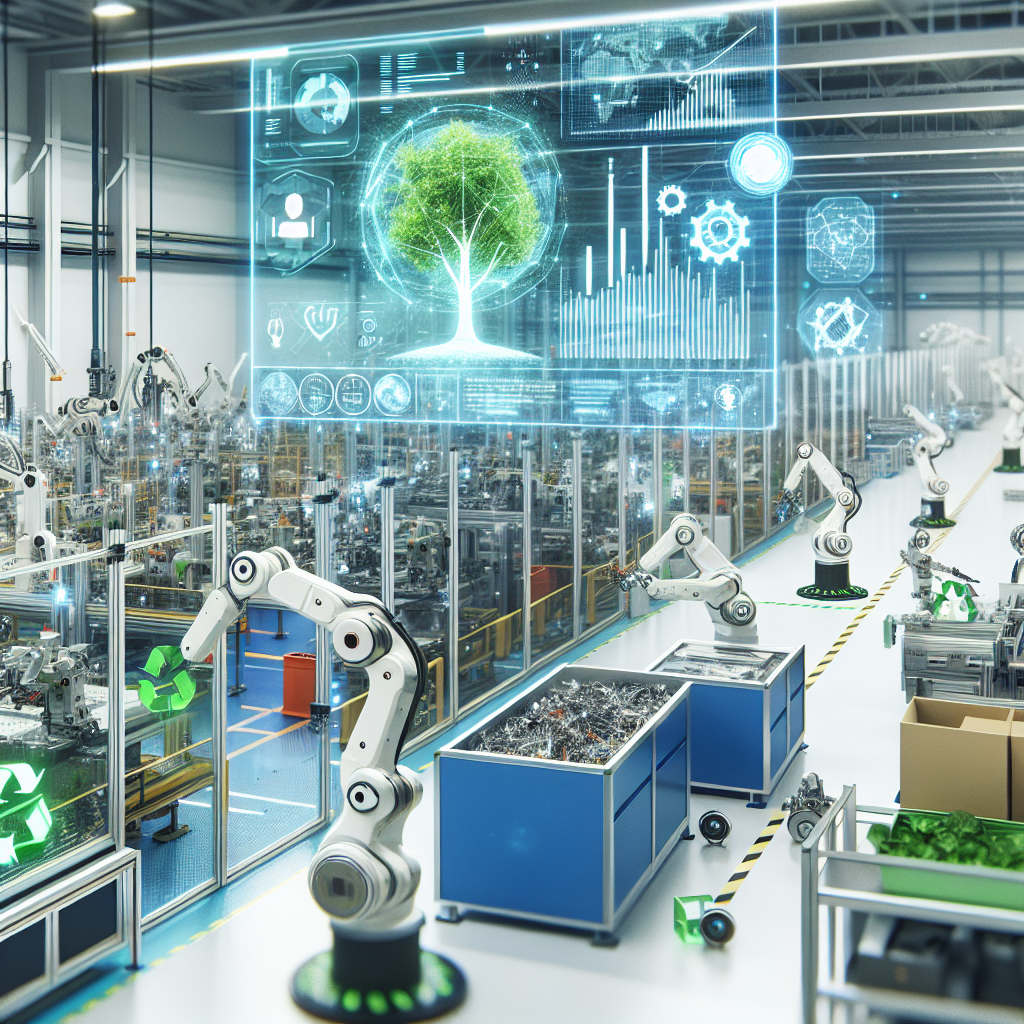In recent years, artificial intelligence (AI) has been revolutionizing various industries, including manufacturing. AI-driven innovations have the potential to transform traditional manufacturing processes, making them more efficient, sustainable, and cost-effective. In this article, we will explore how AI is being used to drive innovation in sustainable manufacturing processes and the benefits it brings to the industry.
AI-driven innovations in sustainable manufacturing processes
1. Predictive maintenance
One of the key ways AI is being used in manufacturing is through predictive maintenance. Traditional maintenance practices are often based on fixed schedules or reactive measures, leading to costly downtime and inefficient operations. AI enables manufacturers to predict when equipment is likely to fail, allowing them to schedule maintenance activities proactively and avoid unexpected breakdowns. This not only reduces downtime but also extends the lifespan of equipment, leading to cost savings and improved sustainability.
2. Energy optimization
Another area where AI is driving innovation in sustainable manufacturing processes is energy optimization. Manufacturing facilities are significant consumers of energy, and optimizing energy usage is crucial for reducing costs and environmental impact. AI algorithms can analyze real-time data from sensors and equipment to identify patterns and anomalies in energy consumption. By optimizing energy usage, manufacturers can reduce their carbon footprint and operational costs, making their processes more sustainable in the long run.
3. Waste reduction
AI is also being used to minimize waste in manufacturing processes. By analyzing data from production lines and supply chains, AI algorithms can identify inefficiencies and areas where waste is being generated. This allows manufacturers to optimize their processes, reduce waste, and improve resource utilization. By reducing waste, manufacturers can lower costs, improve sustainability, and enhance their reputation as environmentally responsible organizations.
4. Product quality control
AI-driven innovations are also improving product quality control in manufacturing processes. AI algorithms can analyze data from sensors and cameras to detect defects or anomalies in real-time. This enables manufacturers to identify and address quality issues early in the production process, reducing scrap rates and improving overall product quality. By ensuring that only high-quality products are shipped to customers, manufacturers can enhance customer satisfaction and reduce the environmental impact of production.
5. Supply chain optimization
AI is revolutionizing supply chain management in manufacturing by enabling real-time visibility and optimization. AI algorithms can analyze data from suppliers, inventory levels, transportation routes, and customer demand to optimize supply chain operations. By streamlining logistics and inventory management, manufacturers can reduce lead times, minimize stockouts, and improve overall efficiency. This not only reduces costs but also enhances sustainability by minimizing waste and emissions associated with transportation and inventory storage.
Benefits of AI-driven innovations for sustainable manufacturing processes
1. Increased efficiency
AI-driven innovations improve the efficiency of manufacturing processes by optimizing energy usage, reducing waste, and enhancing product quality control. By automating repetitive tasks and analyzing data in real-time, AI enables manufacturers to operate more efficiently, reducing costs and improving overall productivity.
2. Cost savings
By optimizing energy usage, reducing waste, and improving product quality control, AI-driven innovations help manufacturers save costs in the long run. Predictive maintenance, for example, reduces downtime and extends the lifespan of equipment, leading to lower maintenance costs. Supply chain optimization minimizes lead times and stockouts, reducing inventory carrying costs. Overall, AI-driven innovations help manufacturers operate more cost-effectively, enhancing their competitiveness in the market.
3. Environmental sustainability
AI-driven innovations contribute to environmental sustainability by reducing energy consumption, minimizing waste, and lowering emissions associated with transportation and production. By optimizing energy usage and reducing waste, manufacturers can lower their carbon footprint and contribute to a more sustainable future. Sustainable manufacturing practices not only benefit the environment but also enhance the reputation of companies as responsible corporate citizens.
4. Improved product quality
AI-driven innovations enhance product quality control by detecting defects and anomalies in real-time. By ensuring that only high-quality products are shipped to customers, manufacturers can enhance customer satisfaction and build brand loyalty. Improved product quality also reduces returns and rework, leading to cost savings and operational efficiency.
5. Enhanced competitiveness
By adopting AI-driven innovations in sustainable manufacturing processes, companies can enhance their competitiveness in the market. Efficient operations, cost savings, and environmental sustainability are key factors that drive customer preference and loyalty. By leveraging AI technologies to improve their processes, manufacturers can differentiate themselves from competitors and position themselves as industry leaders.
FAQs
Q: How does AI enable predictive maintenance in manufacturing processes?
A: AI algorithms analyze data from sensors and equipment to predict when maintenance is needed. By identifying patterns and anomalies in equipment behavior, AI can forecast potential failures and schedule maintenance activities proactively, reducing downtime and extending equipment lifespan.
Q: How does AI optimize energy usage in manufacturing processes?
A: AI algorithms analyze real-time data from sensors and equipment to identify patterns and anomalies in energy consumption. By optimizing energy usage based on production demands and operational requirements, AI helps manufacturers reduce costs and minimize their carbon footprint.
Q: How does AI reduce waste in manufacturing processes?
A: AI algorithms analyze data from production lines and supply chains to identify inefficiencies and areas where waste is being generated. By optimizing processes and resource utilization, AI helps manufacturers reduce waste, lower costs, and improve sustainability.
Q: How does AI improve product quality control in manufacturing processes?
A: AI algorithms analyze data from sensors and cameras to detect defects or anomalies in real-time. By identifying quality issues early in the production process, AI helps manufacturers improve product quality, reduce scrap rates, and enhance customer satisfaction.
Q: How does AI optimize supply chain operations in manufacturing?
A: AI algorithms analyze data from suppliers, inventory levels, transportation routes, and customer demand to optimize supply chain operations. By streamlining logistics and inventory management, AI helps manufacturers reduce lead times, minimize stockouts, and improve overall efficiency.

